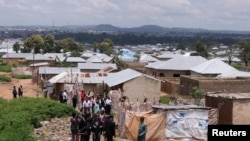UN Secretary-General Antonio Guterres says that the number of terrorism deaths is decreasing globally but increasing in Africa.
“Sub-Saharan Africa accounted for 48 per cent of deaths attributed to terrorist groups globally last year.”
Guterres adds that terrorist groups like al-Qaida, the Islamic State and their affiliates are continuing to grow in the Sahel and make inroads into central and southern Africa.
According to the Global Terrorism Index (GTI), Sub-Saharan Africa is becoming the locus of terrorism, spearheaded by the expansion of the Islamic State and the persistent presence of Boko Haram.
“Deaths attributed to Islamic extremist groups such as Islamic State in West Africa (ISWA), Jama’at Nasr al-Islam wal Muslimin (JNIM), Boko Haram and Al-Shabaab recorded deaths as far south as Mozambique, with 43 percent occurring in the Sahel,”
In 2021, almost 7,142 people died in terrorist attacks globally, just down from the year before, but a one-third decline from the 2015 peak. What is accelerating is the pace of attacks, which jumped by 17 percent to 5,226 attacks last year—the highest number since 2007, when the GTI started counting.
Guterres adds that terrorist groups exploit power vacuums, longstanding inter-ethnic strife, internal weaknesses and state fragilities.
Guterres asserts that terror groups also seek to exploit and manipulate grievances in society and mistrust in governments in largely peaceful countries such as Mozambique and Tanzania.
Terrorist organizations exploit deprivation and alienation to recruit members, with the Islamic State, for instance, promising disaffected European youth “a new life and new opportunities,” the report says, while Boko Haram offers huge salaries in the Sahel.
The report notes that the easing of COVID-related lockdowns and related emergency controls on movement could lead to a spike in terror attacks if the underlying conditions that lead to radicalization in Africa and worldwide are not addressed.
As for Nigeria, Guterres said following his to Borno State, Nigeria, once a Boko Haram stronghold, he is optimistic about that nation's program to reconcile, educate, and reintegrate former combatants into the community as responsible citizens.
“I met people eager to restart their lives, including children who were once associated with Boko Haram," he said, "and women who are committed to ending the cycles of violence and discrimination under which they have suffered for so long.”






